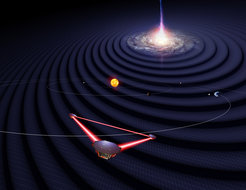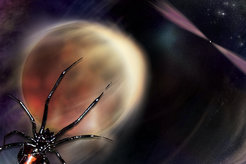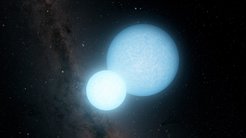Die Nacht, die Wissen schafft 2023
What are scientists at the Max Planck Institute for Gravitational Physics in Hannover and at Leibniz Universität Hannover working on?
On Saturday, November 4, 2023, it's time for another Night of Science: From 6 p.m. to midnight, everyone is invited to discover the university at its various locations. Scientists from all faculties will show their research and teaching, and will be available to answer questions in dialog with guests. The Max Planck Institute for Gravitational Physics (Albert Einstein Institute) in Hannover and the Institute for Gravitational Physics at Leibniz Universität Hannover will participate and offer a diverse program of lectures.
When and where?
All events take place in the institute building (Callinstr. 38, 30167 Hannover) in room 103/106. The way is signposted on site and barrier-free accessible.
All lectures will take place on November 4, 2023. The exact times of the individual events can be found in the listing on this page.
All talks
18:15 - 19:00 | Listening to the sound of the cosmos with LISA (in German) | Gudrun Wanner

LISA (short for “Laser Interferometer Space Antenna”) will be the largest observatory ever built by mankind. The 2.5 million kilometer triangle in space will be spanned by three satellites and, starting in the mid-2030s, will observe gravitational waves from across the Universe. But how does it work? What new things can be learned about the Universe with LISA, and what is happening in Hannover to make this possible? You will get the answers to these questions in this talk.
What new things can we learn about the Universe with LISA?
19:15 - 20:00 | Searching for undead stars with light and space-time ripples (in English) | Anjana Ashok

When massive stars explode as a supernova they sometimes leave behind a neutron star. If this extremely dense and compact object is bumpy, as it rotates, it continuously creates ripples in spacetime, that travel out into the Universe and reach us on Earth. We want to find these continuous signals in data from the LIGO gravitational-wave detectors. This is not an easy task, but we have the help of an additional messenger from the neutron star - light. In this talk, we will learn about a new way of looking at the Universe with multi-messenger astronomy and how light helps us in the hunt for gravitational waves from neutron stars.
A new way of looking at the Universe.
20:15 - 21:00 | Do spiders lay planets in space? (in German) | Lars Nieder

The name “spiders” does not only describe small creepy-crawlies, but also extraordinary objects in space. They consist of a neutron star – an extreme stellar remnant – and its companion star. The neutron star evaporates its companion over time. But now, in this inhospitable stellar neighborhood, evidence for planets has been found. But what is a neutron star? Where do the planets come from? What does all this have to do with spiders? And how can we know all of this?
How do planets get into this inhospitable neighborhood?
21:15 - 22:00 | Studying our Galaxy's graveyard with LISA (in English) | Sweta Shah

After billions of years, a star like our Sun will eventually become a so-called “white dwarf” after it has exhausted its nuclear fuel. These objects consist of matter radically different than every-day matter, have strange properties, and are often found in binary systems. In this talk, I will discuss some of the characteristics of white dwarves in binaries and explain why physicists and astronomers find them interesting. LISA, the first space-based gravitational-wave detector will sense millions of these binaries, vastly increase the known population of these systems, and will provide novel information about such systems.
LISA will sense millions of binary white dwarf systems.
Die Nacht, die Wissen schafft
The “Nacht, die Wissen schafft” (“Night that Creates Knowledge”) at Leibniz Universität Hannover is part of the November der Wissenschaft (November of Science), a project of the Hannover Science Initiative, in which the eight Hannover universities, the Volkswagen Foundation, the Studentenwerk Hannover, scientific institutions and the state capital Hannover are involved. It will take place in 2023 from November 1 to 19 and will provide insights into Hannover as a location for higher education and science at numerous events.















